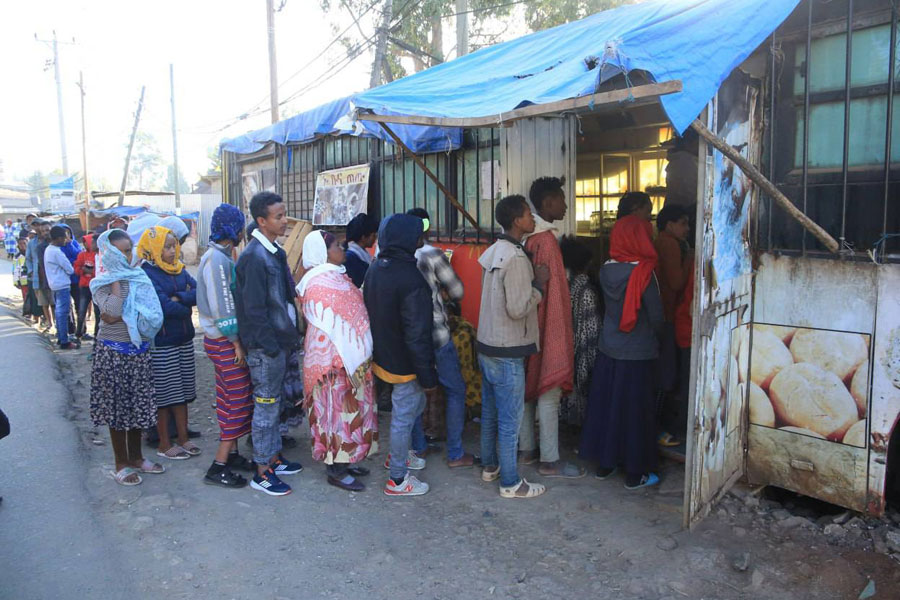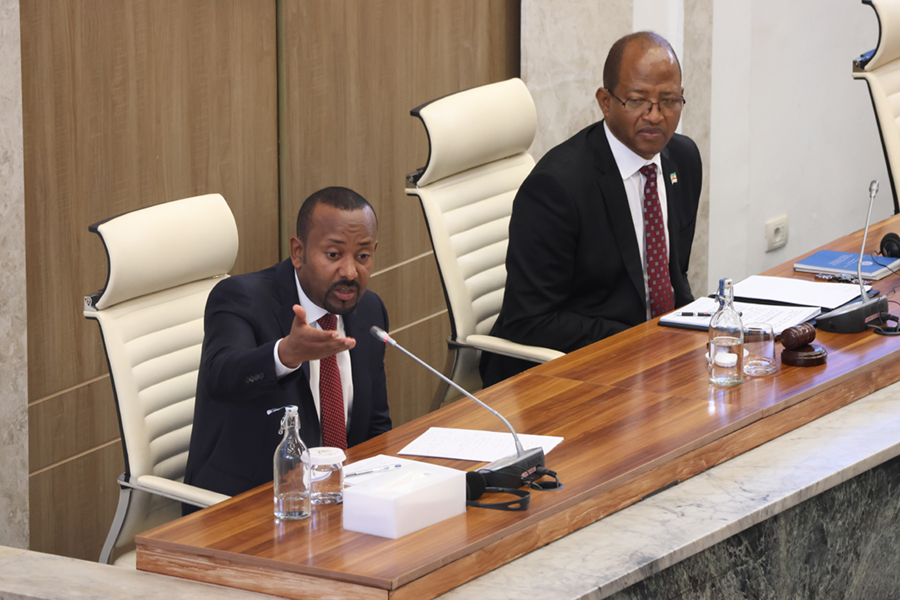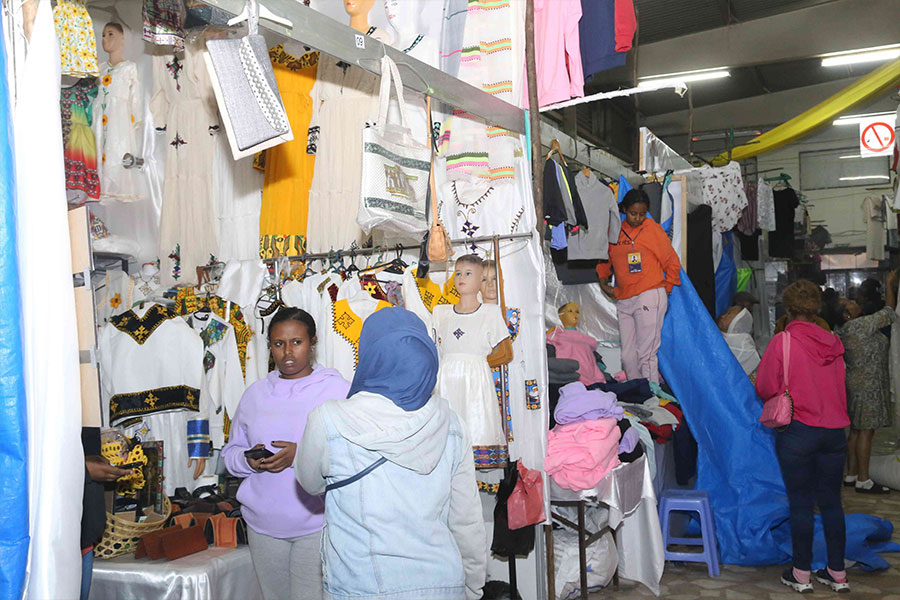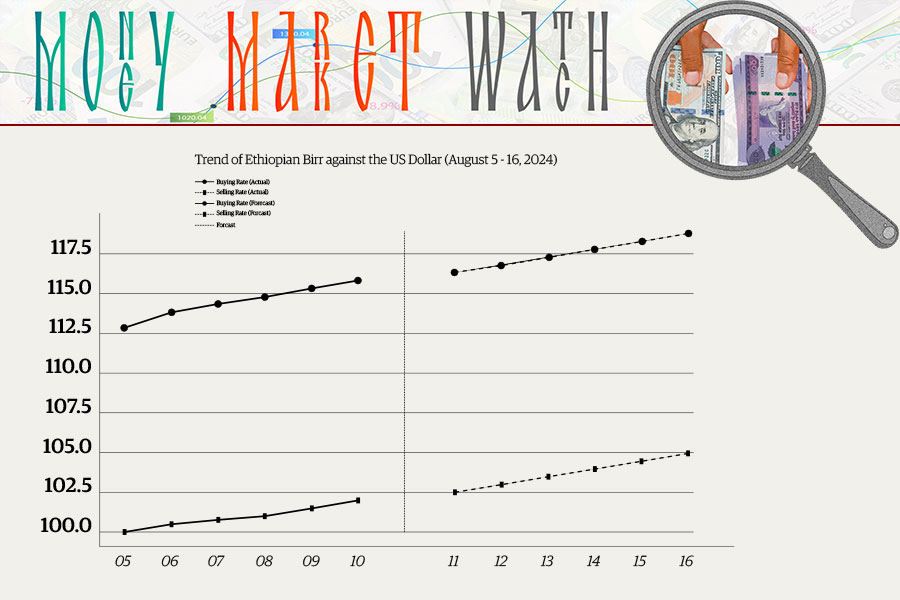
The African Development Bank Group (AfDB) offered a sobering assessment of the continent's economic course, featured by declining financial flows, surging debt service costs, weakening currencies, and spiralling inflation.
At the heart of the Bank's analysis is a call to shift focus from economic growth percentages to more meaningful development indicators. Akinwumi Adesina (PhD), president of the AfDB Group, called for a paradigm shift at a press briefing in Addis Abeba on Friday, February 17, 2024, launching a second macroeconomic performance outlook for Africa. It forecasts a 3.8pc economic growth for Africa, a figure that, while modest, comes in a period marked by stubborn inflation rates anticipated to hover around 17pc for the year.
"We don't eat those things," Adesina said in reference to the projected growth rate during the African Union Heads of State summit.
It is a sentiment pressing the urgency of addressing the persistent poverty afflicting the continent despite its abundant but underutilised natural resources.
The outlook reveals the profound challenges facing African economies as they strive for recovery from pandemics and conflicts. The geopolitical backdrop, evolving with tensions, complicated the economic outlook. Ethiopia, for instance, which recorded historic inflation highs in 2023, had one of the continent's lowest real interest rates, second only to Sierra Leone, at approximately -26pc, representing the severe economic pressures many African countries face.
Rising debt servicing costs were identified as a significant concern, with emphasis placed on using domestic capital markets, accelerating debt servicing procedures through the G-20 Common Framework, and revising Special Drawing Rights (SDR) credit conditions.
Adesina's take on poverty and economic development was echoed by Columbia's economics professor Jeffrey Sachs, who warned against the reliance on short-term loans to achieve long-term economic growth. Sachs labelled the Eurobond market a "trap" and advocated for financing terms spanning at least a quarter-century. His remarks come in the wake of Ethiopia's credit rating downgrade to default by the Fitch Rating Agency in December last year, following the country's failure to make a 33 million dollar coupon payment. The downgrade to restricted default (RD) rating occurred during a climate of double-digit inflation, uncovering the precarious financial position of many African countries.
Sachs praised Ethiopia's strong growth prospects but stressed the need for a multi-decade approach to navigate the current debt and inflation currents.
"Ethiopia's growth prospects are very strong," he told Fortune. "But it needs about 40 years."
He argued that a financially stable environment, characterised by minimal foreign currency loans, healthy liquidity, and a favourable debt structure, could stimulate economic growth without the burden of inflation.
The AfDB report identified a funding squeeze affecting most African countries, driven by higher global interest rates, wider sovereign debt spreads, and exchange rate depreciations. The financial strain comes at a time when Ethiopia is moving to establish capital markets amidst a global credit crunch. Sachs suggested that potential financial assets from Gulf countries could offer some respite, urging stronger ties with China and India to secure long-term finance for core infrastructure projects.
Drawing on his extensive experience with international organisations like the World Bank, the International Monetary Fund (IMF), and the United Nations, Sachs advised rigorous, long-term planning, maintaining high reserve levels, and establishing a macro-prudential regulatory framework before opening capital accounts.
"Every step of inviting banks in requires a macroprudential framework," Sachs told Fortune. "Otherwise, it could lead to troubles."
The need for investment in education was another point where the Summit zoomed in last week. With Sachs advocating for universal school attendance across Africa, the emphasis on education echoed the AfDB's concerns over macroeconomic stability, threatened by elevated public debt and soaring inflation rates.
"Get every African child to school," Sachs noted during a panel discussion at the Sheraton Addis, Taitu St.
The panel was one of several side events held across the city alongside side the African Union (UN) summit, which focused this year on the skill and education of Africans. Several leaders, including those from Nigeria, Rwanda, Comoros, South Africa, South Sudan, Somalia, Brazile and Djibouti, attended the two-day Summit that ended today.
Kevin Chika Urama (PhD), the AfDB's chief economist, noted that approximately 10pc of government revenue in African countries is being consumed by debt servicing, a significant burden given the high inflation rates many of these countries are confronted with. The chief economist expressed his concerns about declining foreign direct investment (FDI) flows, which have halved in the post-COVID era to 45 billion dollars.
Despite this downturn, remittances remain a crucial financing source across the continent. However, the rising costs of debt servicing present a grave concern, even as most African countries stabilised their debt-to-GDP ratios.
Urama's observation comes as African countries face an estimated 74 billion dollars in debt servicing, marking a fivefold increase from 2010. With Ethiopia earmarking around 20pc of its 801.6 billion Br budget for the current fiscal year for debt servicing costs, its macroeconomic situation reflects a broader continental dynamic.
The mounting debt servicing burden has sparked calls for a reassessment of the global financial architecture, with Zimbabwe's Minister of Finance, Mthuli Ncube, who was once AfDB's chief economist, calling for debt relief to spur economic growth.
The potential decline in export revenues for several African countries, in light of the EU's Carbon Border Adjustment Mechanism (CBAM), which restricts the entry of industrial products with significant carbon footprints, shows the need for greater economic interlinkages within Africa. Urama stressed the importance of economic restructuring to cater to the continent's markets, which comprise 1.3 billion people, noting the underpricing of most primary exports from Africa.
"We've to restructure to serve them," he told Fortune.
Ncube pointed out the changing landscape of concessionary resources amid global interest rate fluctuations, noting that interest rates on Special Drawing Rights (SDRs) initially acquired by several African countries from the IMF have surged from 0.2pc to 4.5pc.
"Resources we thought were concessionary are no longer," he said, sounding the alarm over the financial strain felt across the continent.
PUBLISHED ON
Feb 18,2024 [ VOL
24 , NO
1242]

Editorial | Jul 17,2022

Agenda | Feb 18,2023

Fortune News | Jul 07,2024

Radar | Jun 22,2024

Radar | Aug 07,2021

Radar | Nov 09,2024

Radar | May 27,2023

Agenda | Sep 10,2022

Radar | Oct 01,2022

Money Market Watch | Aug 11,2024

Dec 22 , 2024 . By TIZITA SHEWAFERAW
Charged with transforming colossal state-owned enterprises into modern and competitiv...

Aug 18 , 2024 . By AKSAH ITALO
Although predictable Yonas Zerihun's job in the ride-hailing service is not immune to...

Jul 28 , 2024 . By TIZITA SHEWAFERAW
Unhabitual, perhaps too many, Samuel Gebreyohannes, 38, used to occasionally enjoy a couple of beers at breakfast. However, he recently swit...

Jul 13 , 2024 . By AKSAH ITALO
Investors who rely on tractors, trucks, and field vehicles for commuting, transporting commodities, and f...

Jun 28 , 2025
Meseret Damtie, the assertive auditor general, has never been shy about naming names...

Jun 21 , 2025
A well-worn adage says, “Budget is not destiny, but it is direction.” Examining t...

Jun 14 , 2025
Yet again, the Horn of Africa is bracing for trouble. A region already frayed by wars...

Jun 7 , 2025
Few promises shine brighter in Addis Abeba than the pledge of a roof for every family...